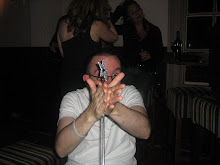Next up we have adaptations of two classic works of British literature from two classic British directors. First of all Charles Dickens' Great Expectations directed by David Lean and then Laurence Olivier's adaptation of William Shakespeare's Henry V. When writing about any of these films its always tempting to go into plot detail but with works of classic literature it feels like retreading old ground a lot of the time so instead I shall simply discuss the style and acting.
First up then Lean's Great Expecations which goes straight into the story as young Pip first encounters the convict Abel Magwitch and is forced to steel food and a file so that the convict can get away and have something to eat. These scenes between the startled Pip and the terrifying Magwitch are some of the film's best and the way they are shot and edited and the music that accompanies them all adds to the haunting mood and rightfully the film did win the Oscars that year for Art Direction and Cinematography. The Art Direction is also prevalent in the later scenes when Pip is invited to play at the house of Miss Havisham and her ward Estella whom Pip falls in love with. Lean again gets it just right showing this house as a large daunting place full of cobwebs and dust where the clocks are stopped to the time when Miss Havisham was stood up at the altar. About an hour into the film the action switches and Pip is now an adult played by John Mills, it is in these scenes that Pip goes to London to live with Alec Guiness' adorable Herbert Pocket and also romances the grown Estella. For me I felt that Mills was miscast as Pip, I felt that he seemed almost too old to be playing a 21 year old and also didn't really convey the fact that he'd made the transition from blacksmith's mate to gentleman in training. But Mills' performance is the exception rather than the rule as there are some fine performances in the supporting cast from Francis L Sullivan as the beligerant lawyer Mr Jaggers to Bernard Miles as the kindly Mr. Joe and Finlay Curire as the terrifying Magwitch all these roles are played as they should be my only criticism is that I feel that Martita Hunt went a little overboard as Miss Havisham almost making her performance lapse into pantomime. As the final scenes come on and Pip finds out who it was that paid for him to become a gentleman and also of Estella's true parentage the film comes together with the final scenes playing out as they should. Lean abridges the book rightfully chopping out the bits that don't really contribute to the overall narrative and at the end producing a great piece of British cinema which was ahead of its time in many ways and was certainly deserving of the two techinical Oscars that it won.
Similarly Olivier's Henry V was deserving of the Special Oscar it won for Laurence Olivier in his achievement of bringing this unique retelling of one of the Bard's most famous works to the screen, he was honoured as a director, producer and actor and excels in all three. This film was shot in technicolour which, in 1944 when it was being shot, was still quite rare and the way the colour is used in this film also feels ahead of its time creating almost like a seperate world as Henry V and his charges head to France. However the film actually starts as a performance in The Globe theatre as we see the audiences take their seats and Leslie Banks, as the chorus, welcomes us to the performance as the actors deliver the first couple of scenes from the stage before Henry and the English hit the sea to France to fight in the Battle of Agincourt. The Agincourt scenes themselves are spectacular, the exterior shots are obviously done in interior studios but at some times I had to sort of take a double back as they are so realistic but at the same time quite obviously fake. This contrast creates almost a surrealist feel and when two soldiers are surrounded by what is meant to be snow covering the French castle it feels out of the ordinary. Olivier makes a brilliant Henry V and his performance and the film as a whole are a lot better than Hamlet the film that won him the Oscar and took home the same prize. Henry V was seen as a morale-booster for the British army and therefore this techincolour marvel was funded by the British Government and some of Olivier's speeches do have a certain morale-boosting resonance to them. This is getting away from just a filmed version of a Shakespeare play and using the medium of film to try and play around with the audience's expecations. I have to say my favourite parts are when the camera goes backstage to see the actors getting ready before taking the stage again at The Globe. As Henry and Katherine get married at the end of the film we return to the theatre with the audience clapping and I'd like to think that the post-war audience was doing the same thing.
O.K. that's your lot for this little update hopefully be back with more Oscar-ness soon.
Subscribe to:
Post Comments (Atom)



No comments:
Post a Comment